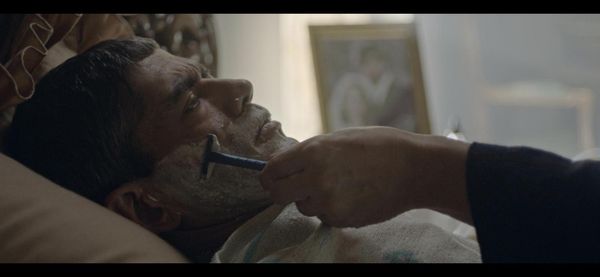Eye For Film >> Movies >> Amigo (2019) Film Review
Amigo
Reviewed by: Jennie Kermode

There’s something about the relationship between a severely disabled person and a carer which seems to distort the perceptions and expectations of outsiders. Perhaps it’s a fear of looking too closely, of seeing aspects of mortality and responsibility which most people would rather not acknowledge. It can be easier, even for those involved, to think of it purely in pragmatic terms, like something mechanical, ignoring the human dimension, without regard to what went before. But as in any other area of human interaction, the reality is that there are complex emotions involved which extend far beyond the care dynamic, and sometimes the weight of the past is much harder to bear.
Óscar Martín’s Fantastic Fest hit opens with an arresting scene. A small, battered looking white car pulls up on a dusty slope in the middle of nowhere, and a tall man (David Pareja) unfolds himself from within. He then sets up a wheelchair and proceeds to extract an even taller man (Javier Botet) from the car, a man whose rigid, skeletal form precisely conforms to the angles of the chair. Together, the two descend the slope, entering a handsomely constructed yet plainly neglected old house. David, the carer, rubs his hands together, apologising for the cold, but tells Javi that he thinks he will like it there. It will be better than the hospital.

Javi is lucky to have a friend to look after him like this, he is told, in that vacant way that many abled people discuss the advantages of being disabled as if it bore no cost. Lucky or not, Javi does not look happy. David tries to cheer him up, taking him down to look at the nearby river, chatting away to him, sitting beside him and turning on a telenovela. At one point he even brings in a sex worker to provide services regarding which Javi is plainly deeply uncomfortable. The ailing man averts his eyes as she does her job, looking instead at a strangulation scene on the television, or at the photograph beside his bed which shows a young, smiling bride, now irrevocably absent.
23 minutes into the film, a shocking thing happens. Javi speaks. What he says is of little consequence. What is fascinating is his prior decision to remain silent through any number of interactions. He is also doing his best to avoid eating. It abruptly becomes apparent that something is very wrong here. A photograph appears to show Javi and David side by side, smiling, in childhood, but are they now friends at all? Why is David doing what he’s doing? A torrent of questions emerges just as David’s nerves are beginning to fray, just as the little silver bell which he has given to Javi for the purpose of summoning help begins to make him want to scream.
There are distinct echoes of What Ever Happened To Baby Jane? in this jarring portrait of two people vying for control whilst their situation disempowers them both. It doesn’t take long for their already fractious relationship to disintegrate further. David’s loyalty gradually gives way to tyranny, and there are scenes of abuse which will be tough for some viewers to watch, sadly commonplace as such incidents are in many disabled people’s lives; but Javi, too, is capable of being dangerous. Built into all this is an insider’s understanding of care dynamics which limns the film with black humour.
Pareja and Botet often perform comedy together and have a seasoned chemistry which makes it easy to buy into the depth and intensity of their characters’ relationship. Some viewers may recognise Botet from his work as a monster performer in the likes of [Rec] and Crimson Peak. It’s good to see him de-monstered, especially in light of how disproportionately rare a sight disabled bodies are in cinema, and to see what he can do with this type of acting role. Furthermore, we get to see the courage and willpower with which Javi pushes his limits and struggles to survive or to pursue his own ends, making him a physically heroic character, every bit as thrilling to watch in that regard as able-bodied adventurers.
The tone of Amigo is always slightly askew. In moments which strain toward serenity, we hear a curious version of Schubert’s Ave Maria, one which builds toward the point of rapture only to deliver a long squeaky note reminiscent of fingernails sliding down a blackboard. There is no true comfort here, nor even stability, just a striving after something impossible to attain, corrupting the noblest emotions, the human interrupting the divine.
Reviewed on: 02 Dec 2022















